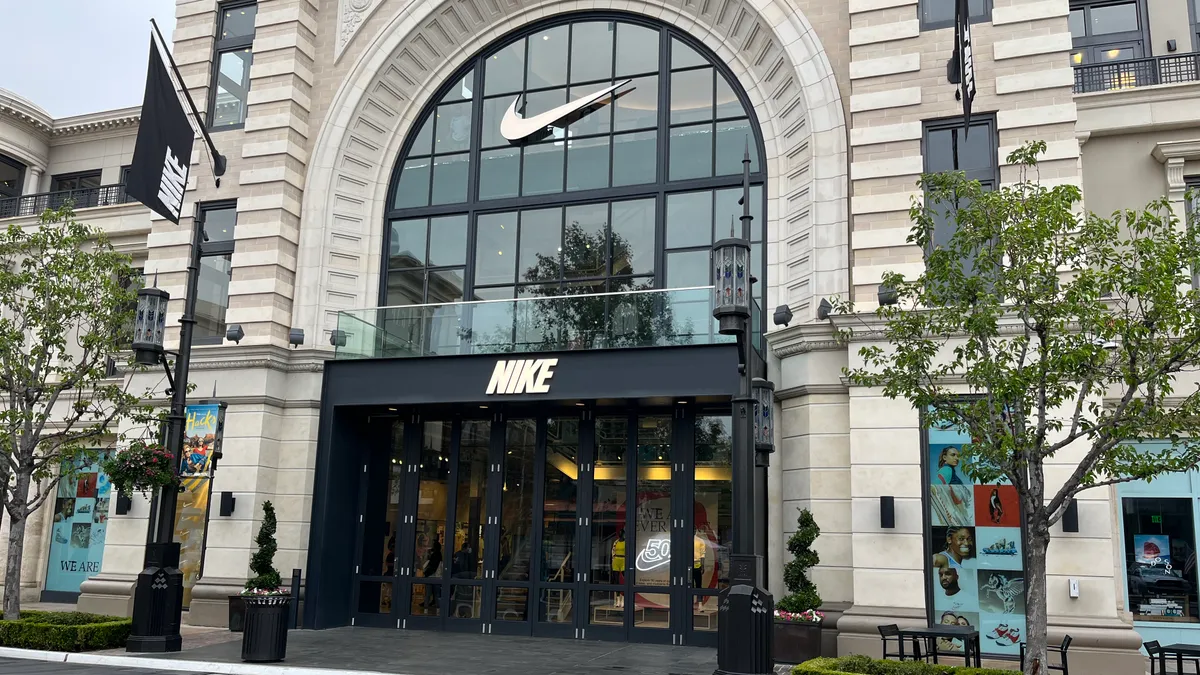Dive Brief:
- Ahead of its first quarter earnings next week, Barclays downgraded Nike’s shares to equal weight on Tuesday, citing a number of factors negatively impacting the athletics giant.
- Among its top reasons, the firm downgraded Nike based on risks in wholesale demand, volatility in China, excess inventory in North America, foreign exchange headwinds, and demand erosion in North America, Europe, the Middle East and Africa.
- Despite the headwinds, Barclays also noted a series of positives for the athletics brand to justify its equal weight rating, including the acceleration of Nike’s direct-to-consumer strategy, high projections for revenue and earnings-per-share growth, and gross margin expansion.
Dive Insight:
Nike is used to smooth sailing, but the company ended its fiscal year in slightly rougher waters.
The company’s fourth-quarter sales declined 1% to $12.2 billion, as sales in Greater China fell almost 20%. Chief Financial Officer Matt Friend said on a call with analysts at the time that COVID-related lockdowns impacted 60% of Nike’s business in the region. The declines in China were offset in the quarter by growth in some of Nike’s other markets, but that may not be enough moving forward.
“We believe the [North America] market may no longer be able to subsidize weaker China results, and wholesale channel risk could keep [Nike] range bound until there is greater visibility,” Barclays analysts led by Adrienne Yih wrote.
China’s zero COVID policy could get worse with flu season approaching, the analysts said, adding that they also believe the country is “supportive of their domestic brands,” Li Ning and Anta Sports, which could mean more pressure on Nike and other athletics brands.
CEO John Donahoe brushed off concerns about China during the retailer’s last earnings call and emphasized a series of China-specific commerce and activity apps the retailer is launching to better connect with shoppers in the area.
“As you know, Nike has been in China for 40 years. We've always taken a long-term view,” Donahoe told analysts in June. “And to be clear, we believe that China remains a growth market with significant potential to unlock. And we've got very strong equity with Chinese consumers.”
But trouble in China is only one of the issues Barclays sees weighing on the athletics retailer. The analysts also highlighted that the upcoming holiday season could be “highly promotional” across the retail industry and that Nike may start receiving fewer orders from its wholesale partners next spring as retailers are forced to clear inventory.
“Recall, throughout the first half of 2022 U.S. retailers spent almost three months buying safety stock positions, on the order of three to seven weeks of increased inventory and earlier receipts, to combat what was perceived to be supply chain risk,” the analysts wrote. “As retailers have seen their demand slow down since April and throughout 2Q22, should they see the negative sales growth in the back half of the year, we believe there could be significant risk to U.S. Wholesale order books in the first half of 2023.”















